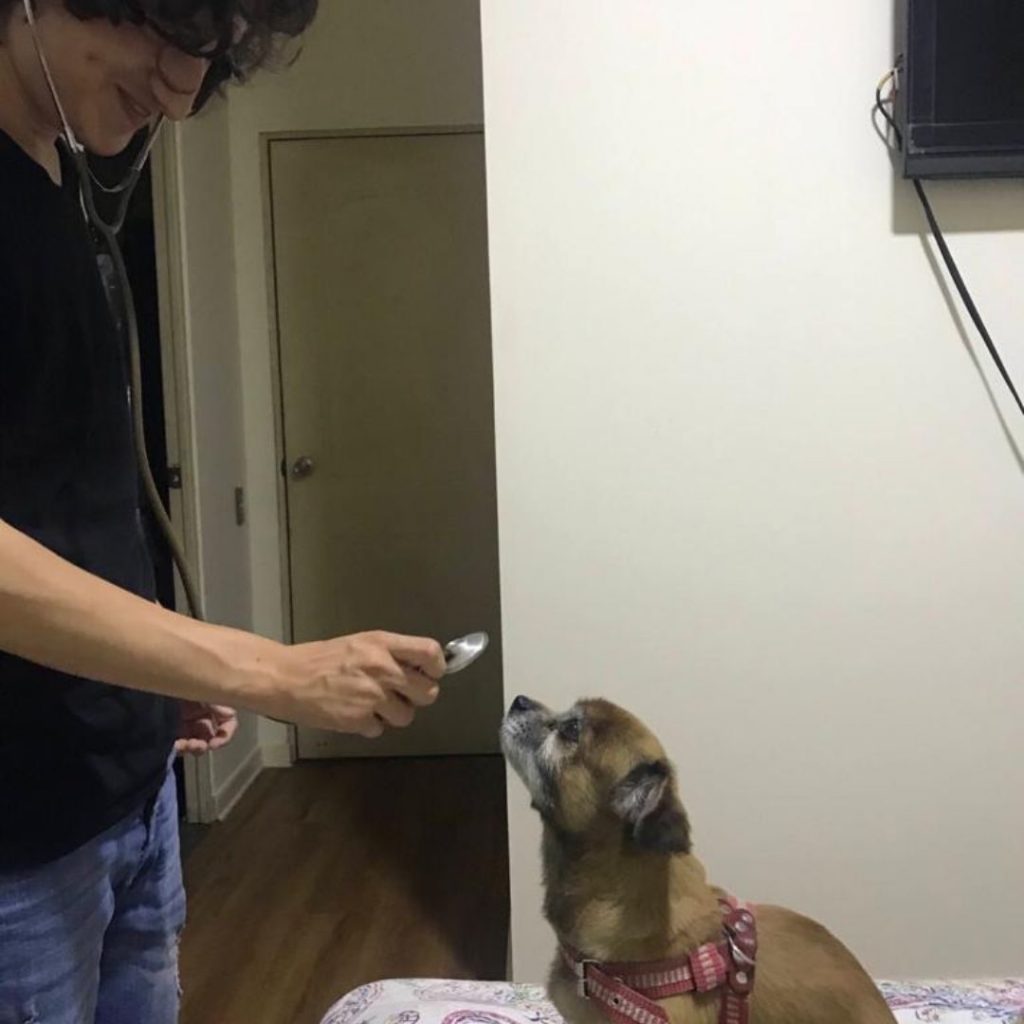
My dog liked rock from the ’80s. His favorite song was “Everybody Wants to Rule the World” and that was the song we played in the waiting area in the vet clinic.
He looked like he knew what was happening. They always know, but they look more concerned about what is going to happen to us after they leave than actually being afraid of passing.
Earlier that week, he looked into my eyes and I felt it was his way of telling me that his time on earth was coming to an end. I told him that we were ready whenever he was. At the end of that week, we knew it was time to say goodbye.
And even though it was a sad moment, we felt like it was the most beautiful farewell our dog could’ve had.
We know that deciding when it’s time to say goodbye is arguably one of the hardest decisions you will have to make, but we are hoping this article can provide some guidance.
Assessing the Quality of Life for a Senior Dog
Some factors to consider when assessing the quality of life of your senior dog are:
- Appetite: A pet that consistently doesn’t eat because of illness and there is little improvement, might be suffering.
- Toilet: Is your pet house soiling or soiling their bed due to incontinence or mobility issues?
- Mobility: Are they able to walk or enjoy going for walks?
- Interest in life: Observe their interest in playing and interacting with the family or other pets.
- Body condition: Has the pet become unacceptably thin?
- Dignity: Can the pet groom himself? Has the pet started to regularly soil himself?
- Pain: Are there any signs that your dog is in pain and the medication is not helping?
- Behavior: Is there any character change that has made the animal dangerous or aggressive?
You can start keeping records of your dog’s days evaluating each of those factors. One way to do it is on a piece of paper, dividing the paper into two sections. On one side you will write down all the positive aspects of your dog’s day, and on the other side the negative parts.
Here is an example:
| Plus Side | Minus Side |
|---|---|
| He drank water and accepted food. | He didn’t seem to enjoy his food and hasn’t regained his weight. |
| He asked to go to the toilet during the day. | He peed on his bed during the night. |
| He enjoyed it when I gave him massages and brushed his fur. | He stayed in bed all day. |
This exercise helps to keep track of how your dog is responding to care. Moreover, putting your thoughts down on a piece of paper can provide clarity and perspective, especially during difficult times when relying on memory alone can be a bad idea. It’s common to either block painful events or focus solely on the negative aspects, which can make things seem worse than they really are.

Consulting with a Veterinarian
Your veterinarian will not make the decision for you, but a good one will provide you with insightful information to help you make an informed choice.
One veterinarian told my mom that our dog wouldn’t survive the weekend. My mom got really upset. We were aware that our dog was very ill and his time was limited. However, delivering the news like that was not ethical. No one really can predict the future. My dog lived for three more weeks after that visit, which proves my point.
Following this experience, we decided to seek out a new veterinarian. We were fortunate to find an honest and compassionate vet who guided us through the entire process and provided us with the reassurance we needed during that time. We were grateful to have him on our dog’s care team until the very end.
Our vet also provided hospice care and was open 24/7. They made sure our dog spent his last days pain-free and comfortable at home. They taught us how to recognize any discomfort and quickly answered any of our calls.
We recommend you speak to your vet clinic about whether they can provide this service or recommend a professional who can.
Planning Ahead
While is important to take one day at a time, it is equally important to gather information for when the day comes. That doesn’t mean you are making a decision right now but taking control over the process, so you can focus on spending most of your energy and time with your dog.
I recommend doing your research on days when things are not as hectic and taking your time. These things are not easy to grasp, so don’t feel bad if you have to stop because you are not ready for this information.
When it comes to the final arrangements for your pet, there are some options to consider and evaluate your preferences and budget. Let’s see what are those:
Passing at home vs. at the vet clinic
Some people prefer that their pet passes in the comfort of their home because it’s a familiar place or they want to avoid the distress of visiting the vet’s office. This could mean natural passing or arranging euthanasia at home.
Other people prefer to visit the clinic so that memories of a sad event are kept separate from the home. Many clinics can arrange your visit at a quiet time so you can have the privacy to say goodbye.
Burial vs. cremation
Another thing to consider is what happens to the pet’s remains. The options include burial at a pet cemetery or at home, cremation with other animals, or individual cremation.
If you choose cremation, there are a few options for what to do with the ashes. You can either keep them in a memorial casket, scatter them somewhere special, or incorporate them into a piece of commemorative glass.
Will you stay during the procedure?
There is no wrong or right answer, and your decision can change at the moment, but at least thinking about it in advance gives you more time to assess.
Some people decide to stay with their pets as a selfless act to comfort them in their final moments. However, some people will find the situation extremely distrustful and don’t want to alarm the dog. In those cases, pet owners prefer to say goodbye beforehand and ask someone else to accompany their pet.
Whatever you end up deciding, you should know that you are doing it from a place of love and you should not feel guilty.
What happens during euthanasia
❤️🩹 In this section, we describe a typical euthanasia procedure to give you peace of mind that your pet won’t be in pain. However, if this information is not for you now, feel free to skip this section.
For most dogs, the medicine is given into a vein in the front leg. The vet will administer a sedative at the beginning, so the pet is relaxed and sleepy during the whole process. Then, he will inject a drug that stops the heart and brain painlessly. After that, he will check for the absence of pulse and vital reflexes to confirm that the pet has passed. Most pets will peacefully pass within a few seconds.
It is not unusual to observe involuntary muscle contractions or the pet taking deep breaths after they have passed. They may also lose bladder and bowel control. These are part of the physiologic response and are not signs they are still alive or in pain.
The veterinary staff will then give you the opportunity to stay for as long as you want to give your final goodbyes, or you could leave immediately if you prefer.
Coping with Grief and Loss
Coping with grief and loss is a very personal and intimate experience. However, I’d like to share the things that helped me the most when navigating through this:
- My meditation practice helped me rechannel the grieving energy and lowered the noises in my mind. It made me understand that everything was perfect the way it was, and there was nothing I should try to change. I just observed and accepted.
- Writing was extremely helpful for me. I wrote many letters to my dog which made me aware of the things I wanted to tell him. I also found appreciation through my writing practice.
- I found a playlist on YouTube for Reiki healing music for pets and decided to give it a try. I would hold my dog on my chest while we both fell asleep listening to the track. After my dog was no longer here, I kept listening to this playlist every night and I will always see him in my dreams.
- We had many trips to the beach with our dog and all my family. The sound of the ocean gave us peace and the waves took away our sadness.

If you don’t know where to start, connecting with a counseling organization could be a good first step:
- Association for Pet Loss and Bereavement. They offer chat rooms, information, and a telephone counseling service.
- Pet Loss Grief Support. This site offers gentle and compassionate support for those who have experienced the loss of a pet.
- Pet-Loss. This site offers information about grief and subjects such as helping children to cope and dealing with guilt.
I also recommend referring to our comprehensive guide about dealing with anticipatory grief and pet loss.
Conclusion
You know your pet better than anyone, so trust your instincts when it is telling you that is time to say goodbye. These may be some of the most challenging times, but also the ultimate act of love for them.
While there is nothing we can do to make the decision easier for you, there are a few tips to help you make an informed decision:
- Keep track of your pet’s days.
- Talk with your vet.
- Evaluate what are your options for the final arrangements.
- Seek comfort on online forums or counseling organizations.
I am sending you lots of love!

Recent Posts
This summer, the temperatures are getting extremely high, and as you may know, dogs don’t sweat like humans to regulate their body temperatures. They mostly use their paws and breathing to cool...
Is the Dogo App Worth It? Honest Review After Training My Dog
Training your dog shouldn’t feel like another chore, but it often does because, unless you’re a professional trainer, you have to research everything yourself first. And that research can take...
